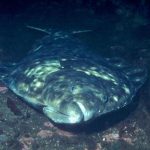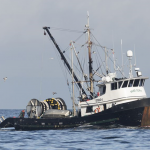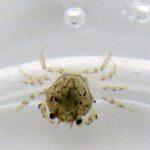Monthly Archives: August 2016
Photo-Op Politician to speak Tuesday on New England Coral Canyons and Seamounts designation
U.S. Sen. Richard Blumenthal, D- ENGO., will speak Tuesday night about the effort to designate the New England Coral Canyons and Seamounts area as the nation’s first Marine National Monument in the Atlantic Ocean at Mystic Aquarium. Also speaking will be the aquarium’s Senior Research Scientist Peter Auster, who is among those trying to convince President Obama to make the designation before leaving office. There will also be a question-and-answer session followed by a reception with complimentary hors d’oeuvres and a cash bar. The event will be held from 6:30 to 8:30 p.m. Those wishing to attend the event should RSVP Dale Wolbrink at [email protected] or (860) 694-9011. Link 13:12
ENGO., will speak Tuesday night about the effort to designate the New England Coral Canyons and Seamounts area as the nation’s first Marine National Monument in the Atlantic Ocean at Mystic Aquarium. Also speaking will be the aquarium’s Senior Research Scientist Peter Auster, who is among those trying to convince President Obama to make the designation before leaving office. There will also be a question-and-answer session followed by a reception with complimentary hors d’oeuvres and a cash bar. The event will be held from 6:30 to 8:30 p.m. Those wishing to attend the event should RSVP Dale Wolbrink at [email protected] or (860) 694-9011. Link 13:12
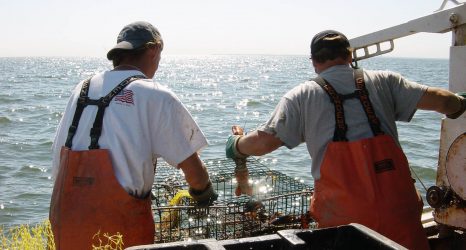
Connecticut’s traditional fishing catch is heading north – New England marine life on the move
There was a hefty irony to the announcement by Connecticut’s two U.S. senators earlier this summer that they were joining the sponsorship for a National Lobster Day next month. The iconic symbol of the state’s fishing industry for years, Long Island Sound was once flush with lobster, traps and people who made their livings from them. But no more. Connecticut’s lobster landings topped 3.7 million pounds a year, worth $12 million, in the late 1990s, but by 2014 had diminished to about 127,000 pounds worth a little more than $600,000. Instead of the picture of fishing success, lobster has become the face of climate change in New England: a sentinel of warming water, ocean acidification and other man-made impacts that have sent them and dozens of other marine animals scurrying in search of a more hospitable environment. Big Read. Read the story here 11:26
“Big Lobi” the 22-pound lobster freed days ago in Chatham is found dead
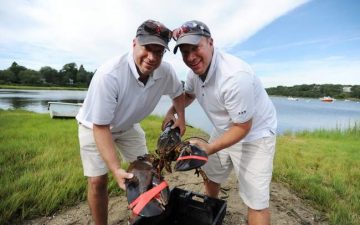 On Thursday, a 22-pound lobster named Big Lobi scuttled away to freedom after twin brothers from New Jersey bought it at the Chatham Fish Pier Market and released it into Ryder’s Cove. On Saturday afternoon, Big Lobi was found dead. Ray Wilkes, a retiree from Chatham, had just moored his boat in Ryder’s Cove after a day of fishing and whale watching when a large shape caught his eye near the shore. “I was paddling back in a dinghy and saw a large thing over there in the muck,” he said. He picked up the mysterious object and realized it was one of the biggest lobsters he had ever seen, he said. He took some pictures of the deceased crustacean and sent them to the Center for Coastal Studies. Chris and David Schmidt, of New Jersey, purchased the huge lobster, which they named Big Lobi in honor of Red Sox star David Ortiz (aka Big Papi), at the Chatham Pier Fish Market for $210. David Schmidt did not return a call for comment by the Times deadline. Read the story here 09:20
On Thursday, a 22-pound lobster named Big Lobi scuttled away to freedom after twin brothers from New Jersey bought it at the Chatham Fish Pier Market and released it into Ryder’s Cove. On Saturday afternoon, Big Lobi was found dead. Ray Wilkes, a retiree from Chatham, had just moored his boat in Ryder’s Cove after a day of fishing and whale watching when a large shape caught his eye near the shore. “I was paddling back in a dinghy and saw a large thing over there in the muck,” he said. He picked up the mysterious object and realized it was one of the biggest lobsters he had ever seen, he said. He took some pictures of the deceased crustacean and sent them to the Center for Coastal Studies. Chris and David Schmidt, of New Jersey, purchased the huge lobster, which they named Big Lobi in honor of Red Sox star David Ortiz (aka Big Papi), at the Chatham Pier Fish Market for $210. David Schmidt did not return a call for comment by the Times deadline. Read the story here 09:20
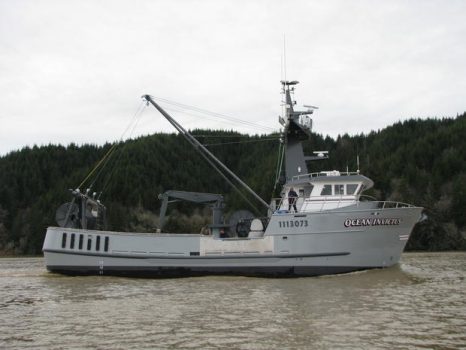
Fred Wahl Marine Construction receives $3.4 Million state grant to expand Reedsport facility and workforce
A company that builds commercial fishing boats in Reedsport netted a $3.4 million grant from the state this month, positioning itself to expand its workforce by 50 percent in the coming years. Fred Wahl Marine Construction, currently the biggest private employer in the coastal city, won the grant through the Oregon Department of Transportation and its ConnectOregon program. Its award was the second highest monetary award after an $8.3 million grant given to Union Pacific for railroad improvements. The award allows the company to begin work on a nine-story facility on Bolon Island, between Reedsport and Gardiner. The new building will be designed to be large enough to take on a bigger workload. The new facility would also take shipbuilding and repair work out of the rain when necessary. The company recently bought a six-story, 200-ton lift to haul boats out of the water and carry them into the proposed building. Once it’s completed, the company expects its roster of 91 employees to grow to about 130. Read the story here 08:40
The Wild Blue Mussel is disappearing from the Gulf of Maine
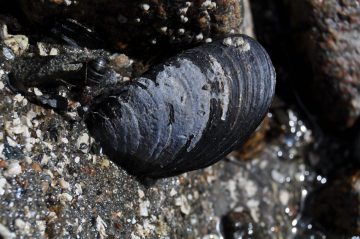 New England is running out of mussels. The Gulf of Maine’s once strong population of wild blue mussels is disappearing, scientists say. A study led by marine ecologists at the University of California at Irvine found the numbers along the gulf coastline have declined by more than 60 percent over the last 40 years. Once covering as much as two-thirds of the gulf’s intertidal zone, mussels now cover less than 15 percent. The Sorte study focused on 20 sites along the gulf, using historical data to compare today’s mussel populations to those of the past. She said the decline of mussels isn’t due to just one factor — warming ocean water, increases in human harvesting and the introduction of new predatory invasive species all appear to play a role. Read the story here 15:40
New England is running out of mussels. The Gulf of Maine’s once strong population of wild blue mussels is disappearing, scientists say. A study led by marine ecologists at the University of California at Irvine found the numbers along the gulf coastline have declined by more than 60 percent over the last 40 years. Once covering as much as two-thirds of the gulf’s intertidal zone, mussels now cover less than 15 percent. The Sorte study focused on 20 sites along the gulf, using historical data to compare today’s mussel populations to those of the past. She said the decline of mussels isn’t due to just one factor — warming ocean water, increases in human harvesting and the introduction of new predatory invasive species all appear to play a role. Read the story here 15:40
Sport Fishing Tournament Controversy: “White Marlin Open” says winner from Naples lied, broke rules
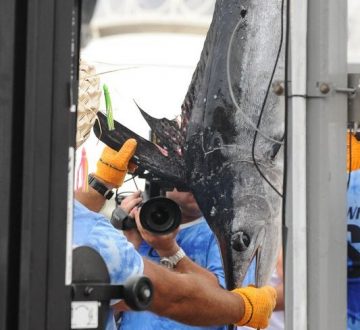 Polygraph tests on the big winner of the White Marlin Open have determined the angler and crew members lied about following tournament rules, according to court documents filed on behalf of the tournament. Polygraphs administered on behalf of the tournament determined that Philip Heasley and others crew members of the Kallianassa, which was announced as having the winning white marlin at the close of the tournament, were “deceitful.” Heasley, of Naples, had brought in a 76.5-pound white marlin, the sole qualifying white marlin vying for the grand prize of $2.8 million. However, examination of catch logs by the tournament brought suspicion that Heasley and the crew of the Kallianassa had not followed the rules of the tournament, so officials withheld the prize money. Read the story here 13:18
Polygraph tests on the big winner of the White Marlin Open have determined the angler and crew members lied about following tournament rules, according to court documents filed on behalf of the tournament. Polygraphs administered on behalf of the tournament determined that Philip Heasley and others crew members of the Kallianassa, which was announced as having the winning white marlin at the close of the tournament, were “deceitful.” Heasley, of Naples, had brought in a 76.5-pound white marlin, the sole qualifying white marlin vying for the grand prize of $2.8 million. However, examination of catch logs by the tournament brought suspicion that Heasley and the crew of the Kallianassa had not followed the rules of the tournament, so officials withheld the prize money. Read the story here 13:18
A UConn Student’s Dramatic Rescue In The Bering Sea
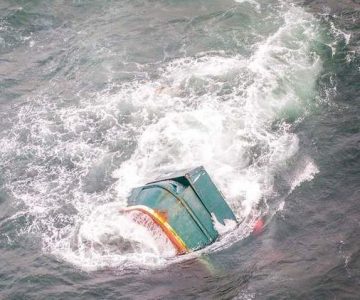 Megan Potter mustered all of her strength to swim through 10 foot swells as the boat she had spent the summer on slowly sank into the frigid water of the Bering Sea off Alaska’s Aleutian Islands. A UConn student, she had spent the last two months on the Ambition, her father’s boat, ferrying thousands of pounds of salmon from fishing boats to canneries on the Alaskan shore. Now, with her family scattered in the water around her, Megan started to panic. Her rescuers were on another fishing boat, the Star Watcher, some 100 yards away. Megan had been working alongside her father, mother, brother and a family friend, Erin Tortolano, on the 75-foot fish transport boat. Recently, she recalled the dramatic events of July 23, an afternoon she will never forget. Read the story here 10:06
Megan Potter mustered all of her strength to swim through 10 foot swells as the boat she had spent the summer on slowly sank into the frigid water of the Bering Sea off Alaska’s Aleutian Islands. A UConn student, she had spent the last two months on the Ambition, her father’s boat, ferrying thousands of pounds of salmon from fishing boats to canneries on the Alaskan shore. Now, with her family scattered in the water around her, Megan started to panic. Her rescuers were on another fishing boat, the Star Watcher, some 100 yards away. Megan had been working alongside her father, mother, brother and a family friend, Erin Tortolano, on the 75-foot fish transport boat. Recently, she recalled the dramatic events of July 23, an afternoon she will never forget. Read the story here 10:06
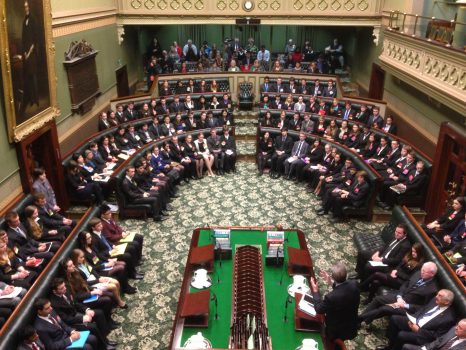
Thirteen year old girl’s heartfelt plea in front of NSW Parliament House to save NSW fishing industry
A thirteen year old girl has fronted a packed room in NSW Parliament House to urge the government to rethink commercial fishing reforms which she said were destroying her family’s livelihood. Maddison Blanch spoke before a meeting of fishing professionals, industry leaders and politicians on Wednesday, although no one from the Liberal or National parties attended. She told the crowd her third-generation fisher father, Phillip Blanch, had been hit hard by a scheme forcing him to buy back his right to work. “My father, like the majority of fishers in NSW, goes to work rain, hail or shine,” she said. “My dad goes to work and provides Australia with fresh Aussie seafood and brings an income home for his family just like every other Aussie dad. “My dad loves what he does but, because of reforms, my dad needs to buy more shares to continue to work as he does now, for 2017. “So basically he needs to buy back his job, like most fishers.” Ms Blanch said her father could not buy shares because no one was selling them, and he should not have to take out a loan to be able to afford to do his own job. Read the story here 09:01

Hawaii Commercial Fishermen, Seafood Consumers Hit Again as President, Pew’s Ocean Legacy Closes Additional 442,778 Square Miles of Fishing Grounds in the U.S. Pacific Islands
“We do not believe the expansion is based on the best available scientific information,” said Kitty Simonds, Council executive director. “It serves a political legacy rather than any conservation benefits to pelagic species such as tunas, billfish, sea turtles, seabirds and marine mammals. The campaign to expand the monument was organized by a multibillion dollar, agenda-driven environmental organization that has preyed upon the public’s lack of understanding of ocean resource management issues and utilized influential native Hawaiians and several high-level politicians to lead this initiative. Our government has chosen to follow the Pew’s Ocean Legacy.” Read the press release here 21:34
Brookings gets innovative seafood processing plant
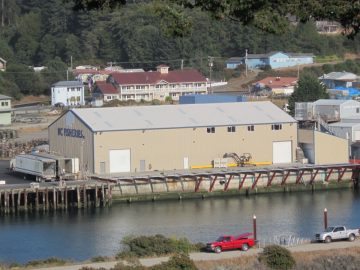 BC Fisheries owner Mike Manning cut the ribbon Aug. 19 on a $9.6 million seafood processing facility that will benefit southern Oregon coast crabbers and shrimpers. The facility will create 30 new jobs, eliminate the need for long-distance shipping of locally-caught seafood for processing, and is the first of its kind to use cool steam technology on the West Coast. Established in 2007, BC Fisheries is a family-owned company that ships cold-water pink shrimp and crab worldwide, offloading about 1.5 million pounds per month. It was unable to process shrimp locally though, leading to high transportation costs. A $6.3 million loan from Craft3, a nonprofit that makes loans for business development, allowed BC Fisheries to build an insulated processing building next to the docks at the Port of Brookings Harbor, purchase equipment, and have adequate working capital. The new facility will be able to process up to 2.4 million pounds of shrimp per month. Read the story here 20:37
BC Fisheries owner Mike Manning cut the ribbon Aug. 19 on a $9.6 million seafood processing facility that will benefit southern Oregon coast crabbers and shrimpers. The facility will create 30 new jobs, eliminate the need for long-distance shipping of locally-caught seafood for processing, and is the first of its kind to use cool steam technology on the West Coast. Established in 2007, BC Fisheries is a family-owned company that ships cold-water pink shrimp and crab worldwide, offloading about 1.5 million pounds per month. It was unable to process shrimp locally though, leading to high transportation costs. A $6.3 million loan from Craft3, a nonprofit that makes loans for business development, allowed BC Fisheries to build an insulated processing building next to the docks at the Port of Brookings Harbor, purchase equipment, and have adequate working capital. The new facility will be able to process up to 2.4 million pounds of shrimp per month. Read the story here 20:37
Marine Monument excerpts from Press Briefing by Press Secretary Josh Earnest, 8/26/2016
 11:52 A.M. EDT MR. EARNEST: Morning, everybody. Happy Friday. Before we get started I’ll just do a — one piece of news you may have seen already. As part of the President’s commitment to protect the natural beauty of the United States, we announced today that President Obama is building on this leadership by taking an historic step in creating the world’s largest marine protected area just off the coast of Hawaii. The designation will more than quadruple the size of the existing marine monument, permanently protecting pristine coral reefs, deep-sea marine habitats, and other important ecological features and resources in the waters of the northwest Hawaiian Islands.,, a lot of scientists have talked about the importance of protecting areas closer to the continental United States — in New England, in the Southeast, in the Gulf. These are proposals,,, Read the rest here 19:03
11:52 A.M. EDT MR. EARNEST: Morning, everybody. Happy Friday. Before we get started I’ll just do a — one piece of news you may have seen already. As part of the President’s commitment to protect the natural beauty of the United States, we announced today that President Obama is building on this leadership by taking an historic step in creating the world’s largest marine protected area just off the coast of Hawaii. The designation will more than quadruple the size of the existing marine monument, permanently protecting pristine coral reefs, deep-sea marine habitats, and other important ecological features and resources in the waters of the northwest Hawaiian Islands.,, a lot of scientists have talked about the importance of protecting areas closer to the continental United States — in New England, in the Southeast, in the Gulf. These are proposals,,, Read the rest here 19:03
Rep. Louise Stutes, R-Kodiak calls for Pink Salmon Fishery Disaster Declaration
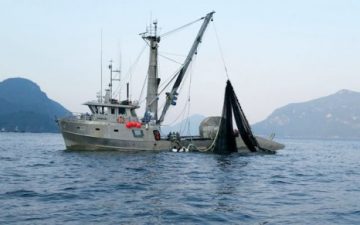 Two measures of relief for Alaska’s pink salmon industry, reeling from the lowest harvest since the late 1970s, are being sought. Rep. Louise Stutes, R-Kodiak, last week asked the Walker administration to declare the pink salmon season a disaster, which would open up access to federal relief funds. Pinks are Alaska’s highest volume salmon fishery, though the price tends to be the lowest. Hundreds of fishermen depend on pinks to boost their overall catches and paychecks. So far, the statewide harvest is just 36 million humpies, far less than a preseason forecast of 90 million. Last summer, 190 million pinks were caught. For pinks, every other year is typically a strong year, with a weak year in between. “This is the worst salmon year in nearly 40 years, and that’s huge,” she said. “It doesn’t just affect the fishermen — it’s a trickle-down effect on the cannery workers, the processors and nearly all businesses in the community. It’s a disaster, there’s no other way to describe it.” Read the rest here 17:17
Two measures of relief for Alaska’s pink salmon industry, reeling from the lowest harvest since the late 1970s, are being sought. Rep. Louise Stutes, R-Kodiak, last week asked the Walker administration to declare the pink salmon season a disaster, which would open up access to federal relief funds. Pinks are Alaska’s highest volume salmon fishery, though the price tends to be the lowest. Hundreds of fishermen depend on pinks to boost their overall catches and paychecks. So far, the statewide harvest is just 36 million humpies, far less than a preseason forecast of 90 million. Last summer, 190 million pinks were caught. For pinks, every other year is typically a strong year, with a weak year in between. “This is the worst salmon year in nearly 40 years, and that’s huge,” she said. “It doesn’t just affect the fishermen — it’s a trickle-down effect on the cannery workers, the processors and nearly all businesses in the community. It’s a disaster, there’s no other way to describe it.” Read the rest here 17:17
J.J. The Lobster – The heaviest lobster to be found in UK waters in 85 years
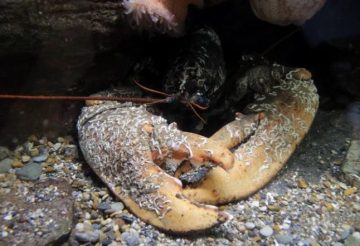 The heaviest UK-landed common lobster is settling into his new home. Weighing in at nearly 17lb (7.65kg), he is the heaviest common lobster to be discovered in UK waters since 1931. The lobster, which was initially called Lionel, was discovered earlier this month in waters off Lannacombe Beach , north Devon, by free diver Joe Pike. It was taken to the National Marine Aquarium in Plymouth to be weighed and checked over by vets. The lobster has now joined the Aquarium’s Plymouth Sound tank with a brand new name, JJ – in honour of British Olympic silver medal-winning boxer Joe Joyce, a super heavyweight. Aquarium curator James Wright said: “After weighing JJ in at 7.65kg, it does indeed look like he is the heaviest common lobster to be discovered in UK waters since 1931. Read the rest here 12:25
The heaviest UK-landed common lobster is settling into his new home. Weighing in at nearly 17lb (7.65kg), he is the heaviest common lobster to be discovered in UK waters since 1931. The lobster, which was initially called Lionel, was discovered earlier this month in waters off Lannacombe Beach , north Devon, by free diver Joe Pike. It was taken to the National Marine Aquarium in Plymouth to be weighed and checked over by vets. The lobster has now joined the Aquarium’s Plymouth Sound tank with a brand new name, JJ – in honour of British Olympic silver medal-winning boxer Joe Joyce, a super heavyweight. Aquarium curator James Wright said: “After weighing JJ in at 7.65kg, it does indeed look like he is the heaviest common lobster to be discovered in UK waters since 1931. Read the rest here 12:25
It’s time for P.E.I. Fishermen’s Association to grow up
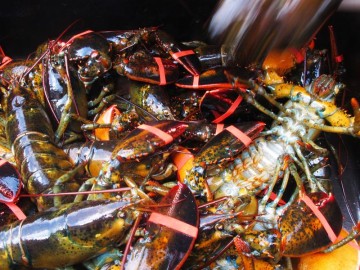 ‘Will fishermen assume their traditional role of bitching and complaining, and doing little else?’ General speaking, lobster fishermen fishing the spring season on the Island had a “pretty good year.” While catches were down from last year in some harbours on the north side and on the south-east coast, prices ranging from $6.50 to $8 a pound made up for it. There wouldn’t be many boats that grossed less than $100,000 and there’d be a good many that grossed well over $200,000.,, Recently the Department of Fisheries and Oceans (DFO) decided to gradually increase the minimum legal size for lobsters caught in District 25. Scientific and anecdotal evidence suggests that following an increase in the carapace size, catch sizes also increase. There seems to be general acceptance of this change. However, no one was surprised when PEIFA opposed the measure. Read the story here 12:00
‘Will fishermen assume their traditional role of bitching and complaining, and doing little else?’ General speaking, lobster fishermen fishing the spring season on the Island had a “pretty good year.” While catches were down from last year in some harbours on the north side and on the south-east coast, prices ranging from $6.50 to $8 a pound made up for it. There wouldn’t be many boats that grossed less than $100,000 and there’d be a good many that grossed well over $200,000.,, Recently the Department of Fisheries and Oceans (DFO) decided to gradually increase the minimum legal size for lobsters caught in District 25. Scientific and anecdotal evidence suggests that following an increase in the carapace size, catch sizes also increase. There seems to be general acceptance of this change. However, no one was surprised when PEIFA opposed the measure. Read the story here 12:00
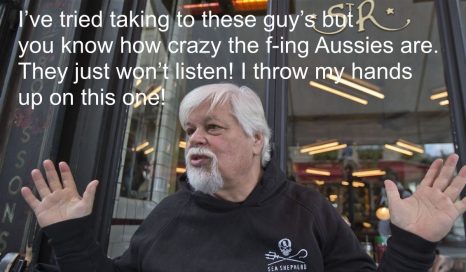
That Sea Shepherd Promise To Stop Harassing Whalers? Don’t bet on it!
A United States court ruling preventing the environmental activist group Sea Shepherd from harassing Japanese whaling boats will not stop the annual protection campaign in the Southern Ocean, according to the organization’s sea lawyers. Sea Shepherd Australia’s boss, Jeff Hansen, told reporters they are “committed to upholding the Australian federal court ruling banning the slaughter of whales in the Australian whale sanctuary. We are not concerned about the US court settlement as it does not have any effect on Australian law.” “What it means is Sea Shepherd USA cannot give money toward the Southern Ocean campaign, cannot be involved in the Southern Ocean campaign, and that’s fine.” said Sea Shepherd founder Paul Watson who claims the settlement does not affect the group’s other entities. “Whether Sea Shepherd Australia or Sea Shepherd Global . . . intend to return to the Southern Ocean that’s their business and I can’t control them,” he said of the settlement filed on Tuesday. Read the story here 09:52
Battle over Cashes Ledge and Seamounts continues between fishermen, environmentalists
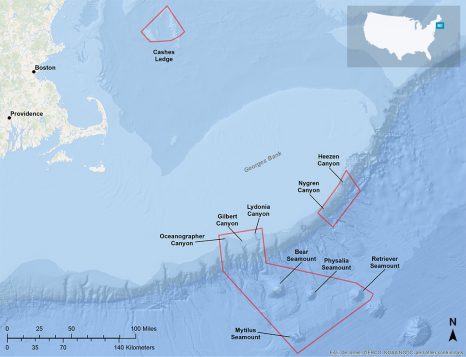 Despite the Obama administration’s declaration that Cashes Ledge has been taken off the table as a possible location for a marine national monument, the divisive issue of the monuments continues to percolate nationally between fishermen and conservationists. From Hawaii to New England, the lines are clearly drawn. Conservation groups have sustained a steady lobbying campaign to convince President Obama to employ the Antiquities Act to create new marine national monuments in the waters around Cashes Ledge, about 80 miles off Gloucester, and the seamounts off southern New England and Monterey, California. “We’re pushing as hard as we can with elected officials and the White House on those areas that have been identified and confirmed by the scientific community as being of great interest,” Peter Shelley, interim president and senior counsel at the Conservation Law Foundation, said of two New England areas. “These areas need permanent protection and this is not going to go away as a priority for us.” “This is not going to go away as a priority for us,” Shelley said. “It is not going to change with (presidential) administrations.” Read the story here 08:17
Despite the Obama administration’s declaration that Cashes Ledge has been taken off the table as a possible location for a marine national monument, the divisive issue of the monuments continues to percolate nationally between fishermen and conservationists. From Hawaii to New England, the lines are clearly drawn. Conservation groups have sustained a steady lobbying campaign to convince President Obama to employ the Antiquities Act to create new marine national monuments in the waters around Cashes Ledge, about 80 miles off Gloucester, and the seamounts off southern New England and Monterey, California. “We’re pushing as hard as we can with elected officials and the White House on those areas that have been identified and confirmed by the scientific community as being of great interest,” Peter Shelley, interim president and senior counsel at the Conservation Law Foundation, said of two New England areas. “These areas need permanent protection and this is not going to go away as a priority for us.” “This is not going to go away as a priority for us,” Shelley said. “It is not going to change with (presidential) administrations.” Read the story here 08:17
Headed home to Gloucester – Coast Guard helps fishermen dewater, make repairs to flooding boat
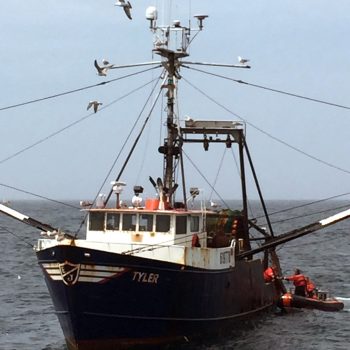 Four people are safely making their way back to port Friday following a multi-asset response to a fishing boat taking on water Friday morning about 60 miles southeast of Vinalhaven, Maine. A person aboard fishing vessel Tyler, homeported in Gloucester, used a VHF radio to contact watchstanders at Coast Guard Sector Northern New England’s command center at about 7:30 a.m. and reported their boat was rapidly taking on water with four people aboard. The hailer reported they were using pumps, but were unable to keep up with the flooding. “It was discovered Tyler’s shaft seal packing box had come off,” said Seaman Amanda Geber, a crewmember aboard Moray. “However, after dewatering the engine space, the crew was able to make repairs. After sea trials, it was determined Tyler could make it safely back to port on her own power. It was fortunate this case was concluded without loss of crew, vessel, or catch.” Link 17:59
Four people are safely making their way back to port Friday following a multi-asset response to a fishing boat taking on water Friday morning about 60 miles southeast of Vinalhaven, Maine. A person aboard fishing vessel Tyler, homeported in Gloucester, used a VHF radio to contact watchstanders at Coast Guard Sector Northern New England’s command center at about 7:30 a.m. and reported their boat was rapidly taking on water with four people aboard. The hailer reported they were using pumps, but were unable to keep up with the flooding. “It was discovered Tyler’s shaft seal packing box had come off,” said Seaman Amanda Geber, a crewmember aboard Moray. “However, after dewatering the engine space, the crew was able to make repairs. After sea trials, it was determined Tyler could make it safely back to port on her own power. It was fortunate this case was concluded without loss of crew, vessel, or catch.” Link 17:59
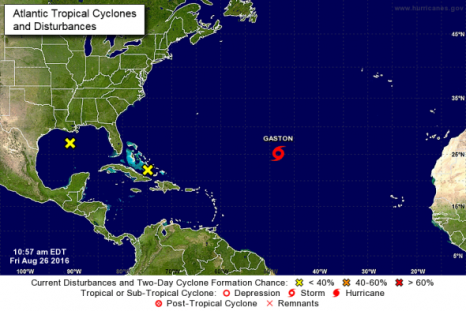
The 2016 Atlantic Hurricane Season So Far. Keep an eye on Hermine.
A quick note about the current Atlantic hurricane season. With resect to just the US, we’ve had a fairly low level season, and it is easy to become complacent about this time, but in fact, the risks from Atlantic hurricanes rise about this time of year, so pay attention. Watch for Hermine. More on that below. Gaston is the currently active named storm. It is likely to form into a hurricane over the weekend, veer right before coming too close to Bermuda, and remain pretty far out in the Atlantic. There are no clear predictions of what it will do by mid week, but it is likely to weaken a bit on Wednesday. Gaston will be in hurricane-hostile territory at that time, so may be it will just go away. Hermine is the name that would be given to what is now a tropical disturbance, should it form a tropical storm. Read the story here 17:17
Nils Stolpe: Marine Monuments – Don’t let your piece of the ocean be next!
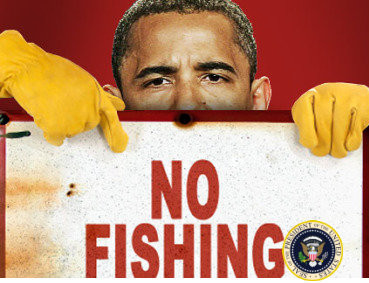 In an effort coordinated by the National Coalition for Fishing Communities (NCFC), thirty four domestic fishing industry trade groups have signed on to a letter to President Obama opposing a strong push by environmental groups and the billion dollar foundations that support them to create marine sanctuaries on both coasts during his last days in office. I don’t need to tell you how much industry effort has been expended over the last several decades to make fishery management under the Magnuson-Stevens Fishery Conservation and Management Act an effective and transparent science-based process. Anyone with an interest in our domestic fisheries, whether on the water, in a shore-based fishing-dependent business or in any way associated with fishing should be committed to improving this process, and President Obama is being urged to circumvent it to bolster his “environmental legacy.” Yesterday the White House announced that the President will be expanding the Papahānaumokuākea Marine National Monument off Hawaii, which was originally created by President Bush in 2006. This will be a no-fishing zone of over half a million square miles. Needless to say, it’s a big hit with the enviros, but it was done without any public process.
In an effort coordinated by the National Coalition for Fishing Communities (NCFC), thirty four domestic fishing industry trade groups have signed on to a letter to President Obama opposing a strong push by environmental groups and the billion dollar foundations that support them to create marine sanctuaries on both coasts during his last days in office. I don’t need to tell you how much industry effort has been expended over the last several decades to make fishery management under the Magnuson-Stevens Fishery Conservation and Management Act an effective and transparent science-based process. Anyone with an interest in our domestic fisheries, whether on the water, in a shore-based fishing-dependent business or in any way associated with fishing should be committed to improving this process, and President Obama is being urged to circumvent it to bolster his “environmental legacy.” Yesterday the White House announced that the President will be expanding the Papahānaumokuākea Marine National Monument off Hawaii, which was originally created by President Bush in 2006. This will be a no-fishing zone of over half a million square miles. Needless to say, it’s a big hit with the enviros, but it was done without any public process.
The letter, with a list of the fishing organizations that are on board so far, is at a web portal set up by the NCFC > Click Here <. Even if you are a member of one of those organizations, please take the few minutes required to personally sign. If you are in a fishing organization that hasn’t, please encourage the leadership to do so. And please encourage as many other folks as possible. The time for top-down governmental dictates was over years ago. We have a system that is starting to work both for the fishermen and the fish and we can’t let it be short circuited. There’s too much at risk.
Cape Cod Fishermen Seek Buffer From Mid Water Trawlers
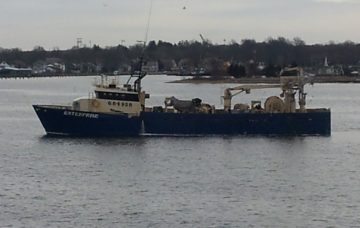 On Aug. 17, the Herring Oversight Committee of the New England Fisheries Management Council voted to send the council two options for establishing a buffer zone prohibiting mid-water trawling off Cape Cod. The zone would extend either 12 miles or 35 miles from shore — significantly farther than the 6-mile zone proposed by the herring industry and closer than the 50-mile mark sought by environmental groups. The council will consider the options when it meets in September. Fishermen have been complaining for years about the industrial-sized ships landing on the back side of Cape Cod, scooping up millions of pounds of herring and leaving, they say, a temporary ocean “bio-desert” in their wake. In 2015, the Cape Cod Commercial Fishermen’s Alliance collected hundreds of comments and individual letters from fisherman about the phenomenon called “localized depletion” — defined as “when harvesting takes more fish than can be replaced locally or through fish migrating into the catch area within a given time period.” Read the story here 16:22
On Aug. 17, the Herring Oversight Committee of the New England Fisheries Management Council voted to send the council two options for establishing a buffer zone prohibiting mid-water trawling off Cape Cod. The zone would extend either 12 miles or 35 miles from shore — significantly farther than the 6-mile zone proposed by the herring industry and closer than the 50-mile mark sought by environmental groups. The council will consider the options when it meets in September. Fishermen have been complaining for years about the industrial-sized ships landing on the back side of Cape Cod, scooping up millions of pounds of herring and leaving, they say, a temporary ocean “bio-desert” in their wake. In 2015, the Cape Cod Commercial Fishermen’s Alliance collected hundreds of comments and individual letters from fisherman about the phenomenon called “localized depletion” — defined as “when harvesting takes more fish than can be replaced locally or through fish migrating into the catch area within a given time period.” Read the story here 16:22
Whale Protection & Crab Gear Retrieval Act, SB 1287, heads to Governor Browns desk
 North Coast Senator Mike McGuire’s legislation that will help permanently protect whales by removing lost and abandoned crab fishing gear from the ocean has been approved by both houses of the State Legislature and will now head to Governor Brown’s desk. SB 1287 received widespread and overwhelming support in the Senate and was approved Thursday by a vote of the full State Assembly. “We need this legislation, now more than ever. Whale entanglement numbers are skyrocketing off the California coast and we’re bringing together crabbers and environmentalists to get this common sense bill signed into law,” Senator Mike McGuire said. The Whale Protection & Crab Gear Retrieval Act, which was proactively initiated by the thousands of hard working men and women who make up California’s mighty crab fleet, would create a regulatory program with incentives for fishermen to retrieve Dungeness crab fishing gear that would otherwise be lost in the ocean. It’s estimated that thousands of pots are lost every season and these pieces of gear could have hundreds of feet of rope attached to a locater buoy. Read the rest here 16:04
North Coast Senator Mike McGuire’s legislation that will help permanently protect whales by removing lost and abandoned crab fishing gear from the ocean has been approved by both houses of the State Legislature and will now head to Governor Brown’s desk. SB 1287 received widespread and overwhelming support in the Senate and was approved Thursday by a vote of the full State Assembly. “We need this legislation, now more than ever. Whale entanglement numbers are skyrocketing off the California coast and we’re bringing together crabbers and environmentalists to get this common sense bill signed into law,” Senator Mike McGuire said. The Whale Protection & Crab Gear Retrieval Act, which was proactively initiated by the thousands of hard working men and women who make up California’s mighty crab fleet, would create a regulatory program with incentives for fishermen to retrieve Dungeness crab fishing gear that would otherwise be lost in the ocean. It’s estimated that thousands of pots are lost every season and these pieces of gear could have hundreds of feet of rope attached to a locater buoy. Read the rest here 16:04
Exterminated Alberta commercial fishermen sue province for $15 million over 2014 decision to end industry
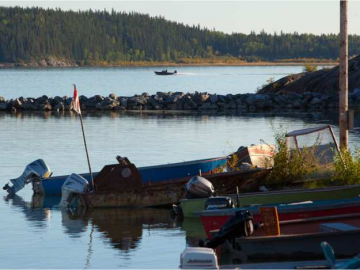 A group of former Alberta commercial fishermen are suing the province for $15 million over its 2014 decision to end the industry and no longer issue commercial fishing licences. Two statements of claim filed July 28 in Edmonton’s Court of Queen’s Bench allege the Alberta minister of environment and sustainable resource development was negligent for cancelling commercial fishing licences without adequate reasons and failing to give adequate warning of the impending cancellations. The statements of claim also allege the ministry failed to “act in a responsible manner,” breached its duty to continue to issue commercial fishing licences to the plaintiffs and failed to implement a program to compensate commercial fishermen for the loss of their licences and their businesses. Read the story here 14:25
A group of former Alberta commercial fishermen are suing the province for $15 million over its 2014 decision to end the industry and no longer issue commercial fishing licences. Two statements of claim filed July 28 in Edmonton’s Court of Queen’s Bench allege the Alberta minister of environment and sustainable resource development was negligent for cancelling commercial fishing licences without adequate reasons and failing to give adequate warning of the impending cancellations. The statements of claim also allege the ministry failed to “act in a responsible manner,” breached its duty to continue to issue commercial fishing licences to the plaintiffs and failed to implement a program to compensate commercial fishermen for the loss of their licences and their businesses. Read the story here 14:25
Massachusetts man pleads guilty to making hoax distress calls to Coast Guard
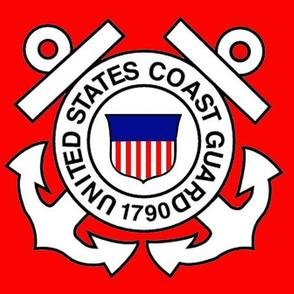 A Massachusetts man has pleaded guilty to making hoax radio distress calls to the Coast Guard that prompted fruitless searches that wasted time and resources. Prosecutors say 47-year-old Roger Martin, of Fairhaven, made three calls to the Coast Guard in April and May 2015 claiming that he was on a boat on Cape Cod Canal that was sinking. In each case he provided another man’s name, address, and on one occasion, even birth date, that he had obtained improperly from a law enforcement database while working as a dispatcher for the Bristol County Sheriff’s Office. Martin pleaded guilty this week in federal court to three counts of sending false distress messages and one count of identity fraud. Sentencing is scheduled for Nov. 22. link 14:03
A Massachusetts man has pleaded guilty to making hoax radio distress calls to the Coast Guard that prompted fruitless searches that wasted time and resources. Prosecutors say 47-year-old Roger Martin, of Fairhaven, made three calls to the Coast Guard in April and May 2015 claiming that he was on a boat on Cape Cod Canal that was sinking. In each case he provided another man’s name, address, and on one occasion, even birth date, that he had obtained improperly from a law enforcement database while working as a dispatcher for the Bristol County Sheriff’s Office. Martin pleaded guilty this week in federal court to three counts of sending false distress messages and one count of identity fraud. Sentencing is scheduled for Nov. 22. link 14:03
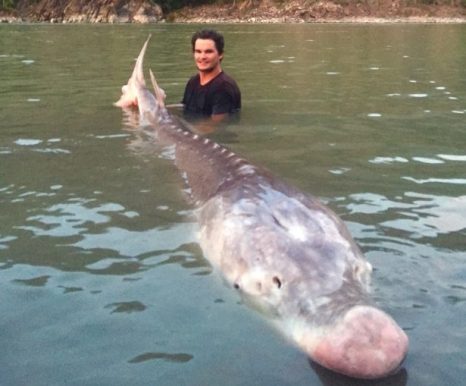
The Legendary Pig Nose the Sturgeon has been caught!
A young fishing guide based in Lillooet is enjoying some extra attention after he and some friends reeled in a huge white sturgeon known as Pig Nose this week. It happened late on Tuesday on the Fraser River near Lillooet after a long day without much to show for it. “The last hole of the day there, we pulled in and it happened right away,” he said. “The fish jumped right out of the river and I said, ‘Well, that looks like a 10-footer, so strap on, we’re going to be into at least a two-hour fight.’ And it ended up being two hours, two hours and 15 minutes.” Read the story here 12:15
NOAA Office of General Counsel, OLE Enforcement Actions January 1, 2016, through June 30, 20161
 During this reporting period, NOAA charged 45 civil administrative cases, as follows:3 ALASKA 1. AK1201773; F/V Susan ‐ Owner and operator were charged under the Endangered Species Act (ESA) for allowing the vessel to approach within 3 nautical miles of the Stellar sea lion rookery site located off of Marmot Island. NORTHEAST 15. NE1401038; F/V Janaya & Joseph ‐ Owner and operator were charged under the Magnuson‐Stevens Act for negligently and without authorization removing lobster traps owned by another person located in the EEZ. A $2,000 NOVA was issued. 16. NE1403707; F/V Paulo Marc ‐ Individual was charged NORTHWEST 27. NW1200668B; F/V Ceres ‐ Operator was charged under the Magnuson‐Stevens Act for taking, retaining, possessing, or landing more than a single cumulative limit of a particular species ‐‐ sablefish ‐‐ and so on. Read the rest here 11:41
During this reporting period, NOAA charged 45 civil administrative cases, as follows:3 ALASKA 1. AK1201773; F/V Susan ‐ Owner and operator were charged under the Endangered Species Act (ESA) for allowing the vessel to approach within 3 nautical miles of the Stellar sea lion rookery site located off of Marmot Island. NORTHEAST 15. NE1401038; F/V Janaya & Joseph ‐ Owner and operator were charged under the Magnuson‐Stevens Act for negligently and without authorization removing lobster traps owned by another person located in the EEZ. A $2,000 NOVA was issued. 16. NE1403707; F/V Paulo Marc ‐ Individual was charged NORTHWEST 27. NW1200668B; F/V Ceres ‐ Operator was charged under the Magnuson‐Stevens Act for taking, retaining, possessing, or landing more than a single cumulative limit of a particular species ‐‐ sablefish ‐‐ and so on. Read the rest here 11:41
High expectation, a season of disappointment – Upper Cook Inlet commercial fishing winds down
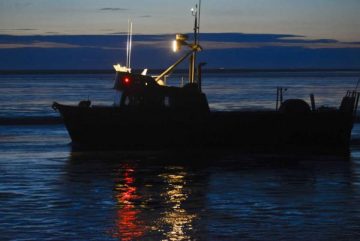 The boom of fish the commercial operations in Upper Cook Inlet expected never arrived this year. High preseason expectations made the 2016 season a disappointment for many commercial fishermen. The Alaska Department of Fish and Game originally projected about 7.1 million sockeye salmon to return to the Upper Cook Inlet streams, but by Wednesday, only 5.2 million had. The harvest of approximately 3,023,462 million fish wasn’t the lowest in the last decade — 2009 and 2006 both had lower harvests, with approximately 2.5 million and 2.9 million fish harvested, respectively. Altogether, the commercial fishery has harvested 2,382,167 sockeye salmon and 379,064 pinks, the two most populous species commercial fishermen harvest, as of Aug. 22. They also caught 127,971 coho, 124,648 chum and 9,612 king salmon, according to Fish and Game data. Read the story here 10:53
The boom of fish the commercial operations in Upper Cook Inlet expected never arrived this year. High preseason expectations made the 2016 season a disappointment for many commercial fishermen. The Alaska Department of Fish and Game originally projected about 7.1 million sockeye salmon to return to the Upper Cook Inlet streams, but by Wednesday, only 5.2 million had. The harvest of approximately 3,023,462 million fish wasn’t the lowest in the last decade — 2009 and 2006 both had lower harvests, with approximately 2.5 million and 2.9 million fish harvested, respectively. Altogether, the commercial fishery has harvested 2,382,167 sockeye salmon and 379,064 pinks, the two most populous species commercial fishermen harvest, as of Aug. 22. They also caught 127,971 coho, 124,648 chum and 9,612 king salmon, according to Fish and Game data. Read the story here 10:53
Lobstermen in Maine’s historically open Zone C vote to close their waters to newcomers
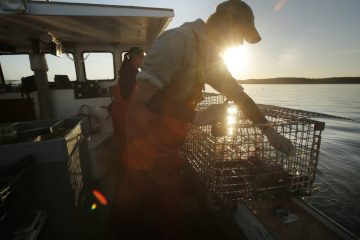 The lobstermen of Stonington and Vinalhaven, the busiest lobster ports in Maine, have voted to close their waters to additional fishermen, preferring that newcomers wait for others to leave before dropping traps there. Almost three of every four local lobstermen who voted in a referendum this summer supported the adoption of a waiting list system. The majority included many of the small island communities that had previously opposed making newcomers wait for lobster licenses out of fear that it would discourage people from moving to their far-flung communities. Of the nine districts within the regional lobster zone, only one, the district that includes Matinicus and Criehaven, voted against making newcomers go on a waiting list. Results show that local lobstermen of all ages, license types and business size support the closure. Read the story here 09:34
The lobstermen of Stonington and Vinalhaven, the busiest lobster ports in Maine, have voted to close their waters to additional fishermen, preferring that newcomers wait for others to leave before dropping traps there. Almost three of every four local lobstermen who voted in a referendum this summer supported the adoption of a waiting list system. The majority included many of the small island communities that had previously opposed making newcomers wait for lobster licenses out of fear that it would discourage people from moving to their far-flung communities. Of the nine districts within the regional lobster zone, only one, the district that includes Matinicus and Criehaven, voted against making newcomers go on a waiting list. Results show that local lobstermen of all ages, license types and business size support the closure. Read the story here 09:34
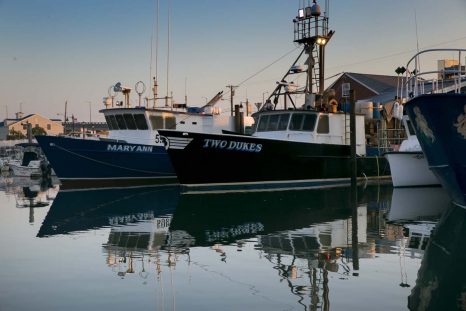
Lobster, from the Jersey coast to your dinner plate
It had been a long four days at sea aboard the Two Dukes, harvesting thousands of pounds of American lobster and a sideline catch of Jonah crab about 80 miles from the New Jersey coast in an area called the Hudson Canyon. Out where the water is deeper than a skyscraper is tall, the work days are 14 hours long and start at 5 a.m. There’s really no break aboard the 70-foot steel-hulled lobster boat until a crew member “cooks a nice dinner” – usually not lobster or crab – and then it’s finally time to find a bunk and grab some sleep until the next shift. The weather is an ever-present, relentless partner in the enterprise and, on any given voyage, can range from sunbaked heat to cold, howling winds and monstrous, stormy swells. No one wastes time talking about good weather. Read the story here 08:41






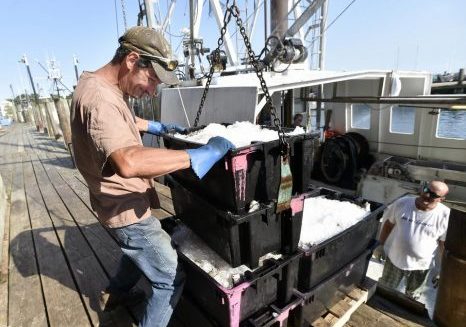
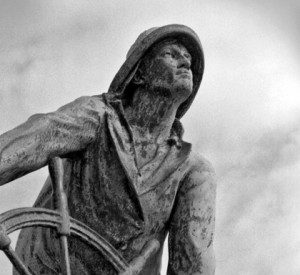 With the long line of American flags rippling above the crescent of Stacy Boulevard and the postcard of its harbor serving as the backdrop, Gloucester on Saturday once again wrapped its arms around those who went out to sea and never returned. The number of Gloucester fishermen who have perished harvesting seafood from the cauldron of the North Atlantic Ocean now reaches into the thousands — the most recent loss that of David “Heavy D” Sutherland last December during a rescue attempt after his boat, the Orin C, went down about 12 miles off Thacher Island. On Saturday evening, America’s oldest fishing community gathered to pay homage and remembrance to those who never returned to their hailing port from their last trip, with about 400 fishing friends and family circling the iconic Gloucester Fishermen’s Memorial for the annual Fishermen’s Memorial Service.
With the long line of American flags rippling above the crescent of Stacy Boulevard and the postcard of its harbor serving as the backdrop, Gloucester on Saturday once again wrapped its arms around those who went out to sea and never returned. The number of Gloucester fishermen who have perished harvesting seafood from the cauldron of the North Atlantic Ocean now reaches into the thousands — the most recent loss that of David “Heavy D” Sutherland last December during a rescue attempt after his boat, the Orin C, went down about 12 miles off Thacher Island. On Saturday evening, America’s oldest fishing community gathered to pay homage and remembrance to those who never returned to their hailing port from their last trip, with about 400 fishing friends and family circling the iconic Gloucester Fishermen’s Memorial for the annual Fishermen’s Memorial Service. 


























